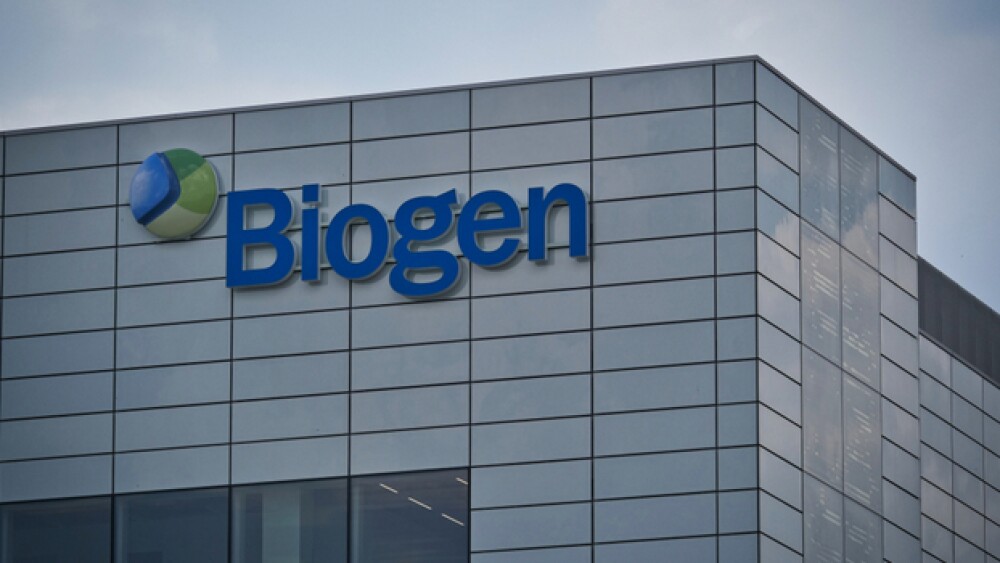Biogen is buying a novel CNS-penetrate inhibitor of casein kinase 1 (CK1) from Pfizer to develop for patients with behavioral and neurological symptoms in various psychiatric and neurologic diseases.
PictureDesignSwiss / Shutterstock
Biogen is buying a novel CNS-penetrate inhibitor of casein kinase 1 (CK1) from Pfizer to develop for patients with behavioral and neurological symptoms in various psychiatric and neurologic diseases. Biogen indicates its initial focus will be to develop the Phase I compound for Sundowning in Alzheimer’s disease (AD) and Irregular Sleep Wake Rhythm Disorder (ISWRD) in Parkinson’s disease (PD).
Under the terms of the deal, Biogen is paying Pfizer $75 million upfront with up to $635 million in various milestones, as well as tiered royalties in the high single digits to sub-teens.
Sundowning affects about 20% of AD patients. It occurs later in the day (around sundown) and they often become confused, anxious, aggressive, agitated or restless. ISWRD is a circadian rhythm problem in Parkinson’s patients who have broken sleep which causes daytime sleepiness, severe fatigue and difficulty with daily living. It typically becomes more common over the course of the disease.
The asset is PF-05251749 and inhibits CK1, a key regulator of the central body clock known as the suprachiasmatic nucleus of the hypothalamus. In a previous Phase Ia study the drug demonstrated an acceptable safety profile and proof of mechanism.
Biogen wants to launch a Phase Ib trial in the fourth quarter of this year.
“This asset is highly complementary to our existing pipeline of potential disease-modifying therapies in Alzheimer’s and Parkinson’s diseases,” said Alfred Sandrock Jr., executive vice president, Research and Development and chief medical officer at Biogen. “Many patients with Alzheimer’s and Parkinson’s suffer from debilitating sleep disorders and agitation, and we believe that the regulation of the circadian rhythm may hold promise in addressing these challenging behavioral and neurological symptoms.”
There is quite a bit of interest in what Biogen intends to do in the near future. A lot is riding on its aducanumab for Alzheimer’s disease, which was declared a failure in March 2019, but was resurrected this year after some of the later trial data showed effectiveness at the highest dose. Still, it’s not a slam dunk to be approved by the U.S. Food and Drug Administration (FDA) and there are plenty of skeptics.
Right around the same time, in December, Biogen quietly closed down a program to study gosuranemab for progressive supranuclear palsy (PSP), a rare brain disorder caused by abnormal tau proteins in the brain. The PASSPORT Phase II trial did not meet its primary endpoint on the PSP rating scale (PSPRS) at week 52. It also did not show efficacy on key clinical secondary endpoints.
The company indicated it was shuttering its gosuranemab program for PSP and other primary tauopathies. The company plans to continue its ongoing Phase II TANGO trial of gosuranemab for mild cognitive impairment related to Alzheimer’s disease or mild AD.
A short while later, Biogen licensed IONIS-MAPTRX from Ionis Pharmaceuticals. The product is an antisense therapy that selectively decreases production of the microtubule-associated protein tau (MAPT) in the central nervous system. Tau is one of two major proteins associated with Alzheimer’s disease, the other being beta-amyloid. Beta-amyloid is the target of Biogen’s aducanumab.
Amyloid appears throughout the disease, but tau typically shows up in tangles later in the disease. Tau is also implicated in other diseases, so-called tauopathies, including chronic traumatic encephalopathy (CTE), frontotemporal dementia, parkinsonism, progressive supranuclear palsy (PSP) and others.





